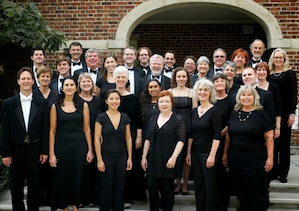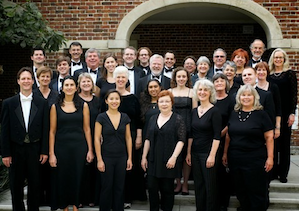
A Christmas concert is, by definition, a traditional affair, usually with well-known repertoire that has become — for better or worse — an inextricable part of the holiday season. There’s always a time and a place for traditional Christmas music, especially when it’s well-performed.
But with “Christmas in Antwerp and Amsterdam,” the California Bach Society (CBS) showed last weekend that there’s a wealth of less well-known holiday repertoire by Renaissance and Baroque composers from the Low Countries. And, judging by the grateful and warm reception by the audience at Friday’s concert in St. Mark’s Lutheran Church in San Francisco, some of it would be more than worthy of a place in the canon of “familiar” Christmas music.
“Low Countries” refers to the area that now embraces Belgium, Luxemburg, the Netherlands, and part of northern France. During the 16th and 17th centuries, wealthy merchants in cities such as Bruges, Brussels, Ghent, Antwerp, and Amsterdam fueled the development of science and the arts, which gave rise to several generations of painters and musicians who were in high demand all over Europe, especially in Italy. The Flemish composer Adriaen Willaert (1490–1562), arguably the most famous representative of the Franco-Flemish style, was maestro di capella at St. Mark’s Cathedral in Venice for 35 years, and he founded what became known as the Venetian School.
CBS Artistic Director Paul Flight had programmed Willaert’s six-part motet O beata infantia, which was possibly the evening’s hardest musical nut to crack, yet the 30 vocalists of the Society made it appear easy. The choral sound was fluid, pure, and completely transparent, also through the interweaving melodic lines of the multipart motets such as Resonet in laudibus by Orlande de Lassus (1532–1594) and in the jubilant Hodie Christus natus est by Jan Pieterszoon Sweelinck (1562–1621).
The choral sound was fluid, pure, and completely transparent.
Employing his finely tuned enthusiasm as a conductor, Flight draws the very best from his singers and musicians, and under his hands the ensemble on Friday sounded fresh and completely relaxed; it was a pleasure to see and hear them at work.
Gems From a Rich Vault
The second half of the concert was largely devoted to the Cantiones natalitae (literally, “birth songs”), a collection of traditional Christmas carols by lesser-known Flemish church composers that was first published in 1604. The songs, with texts in Flemish (Dutch) and Latin, are based on folk tunes and melodies that date back to the Middle Ages. Flight selected a number of absolute gems from this collection. In beautifully pronounced, near-perfect Dutch (which is not easy for English speakers; I myself am Dutch), the vocalists sang precious carols like O zalig heilig Bethlehem (Oh holy, blessed Bethlehem) by Guilielmus Messaus (1589–1640) and Puer nobis nascitur by an anonymous composer.
Praise, too, for the musicians of the orchestra for their excellent accompaniment of the choir.
Honorable mentions should go to soprano Caroline Jou Armitage, who gave an absolutely beautiful rendering of Messaus’ Het viel eens hemels dauwe (Heaven’s dew fell), assisted by John Lenti on lute. All praise, too, for the musicians of the orchestra for their excellent accompaniment of the choir and the energetic instrumental interlude during which the ensemble (assisted by several choir members and Paul Flight himself) played dance melodies by Tielman Susato (1510/15–ca. 1570), who, incidentally, founded the first music publishing house in the Low Countries (in Antwerp in 1543).
One more extra-special honorable mention should go to composer Joannes Berckelaers (ca. 1630–ca. 1700), who wrote Hoe leyt dit kindeken (See how this Baby lies here), which to my ears may be the most beautiful Christmas carol in history, transcending even Franz Gruber’s Silent Night. If Friday night’s heartfelt and well-deserved bravos were any indication, those who were fortunate enough to attend one of the concerts this past weekend might agree.

